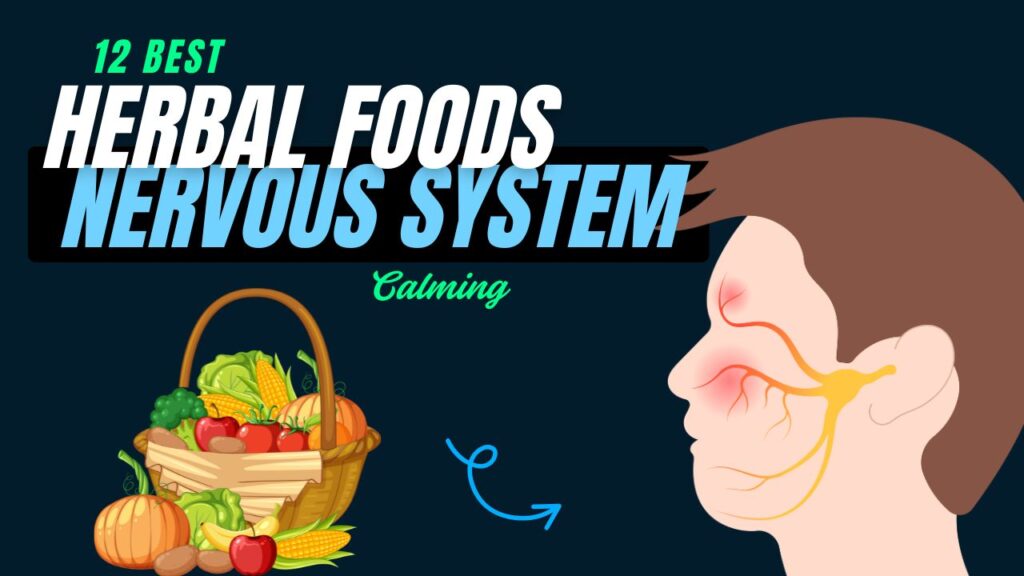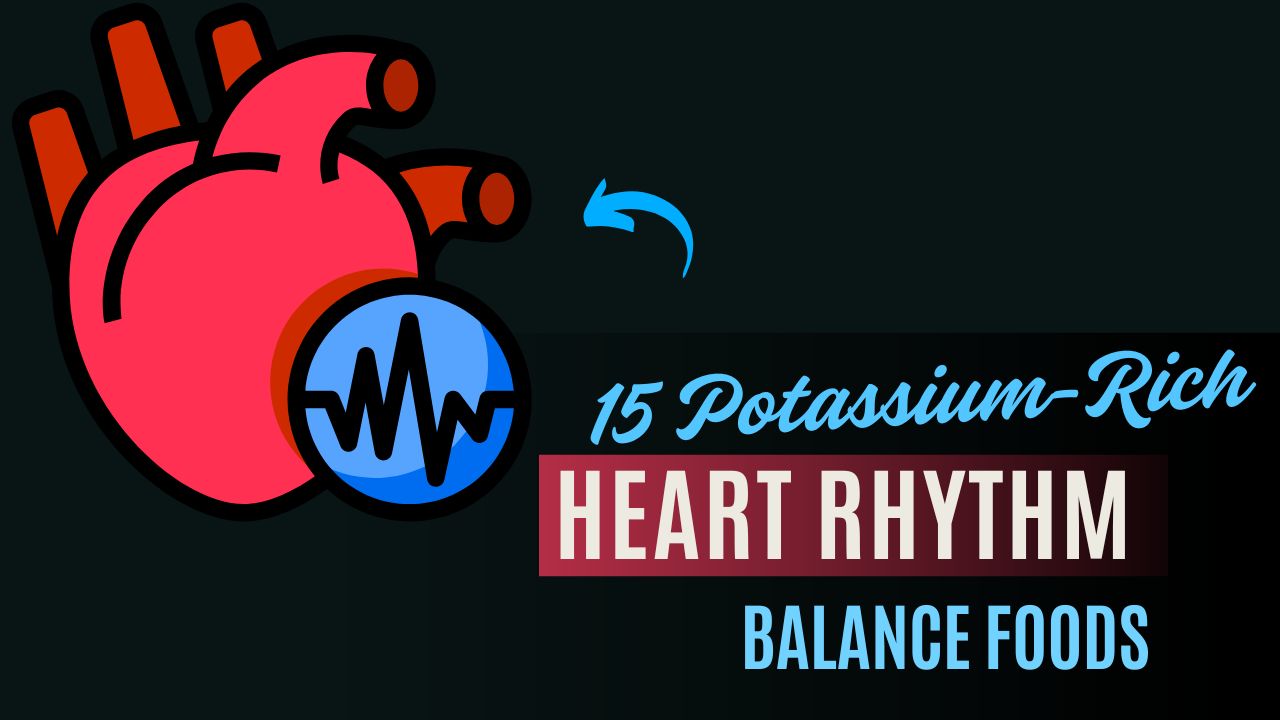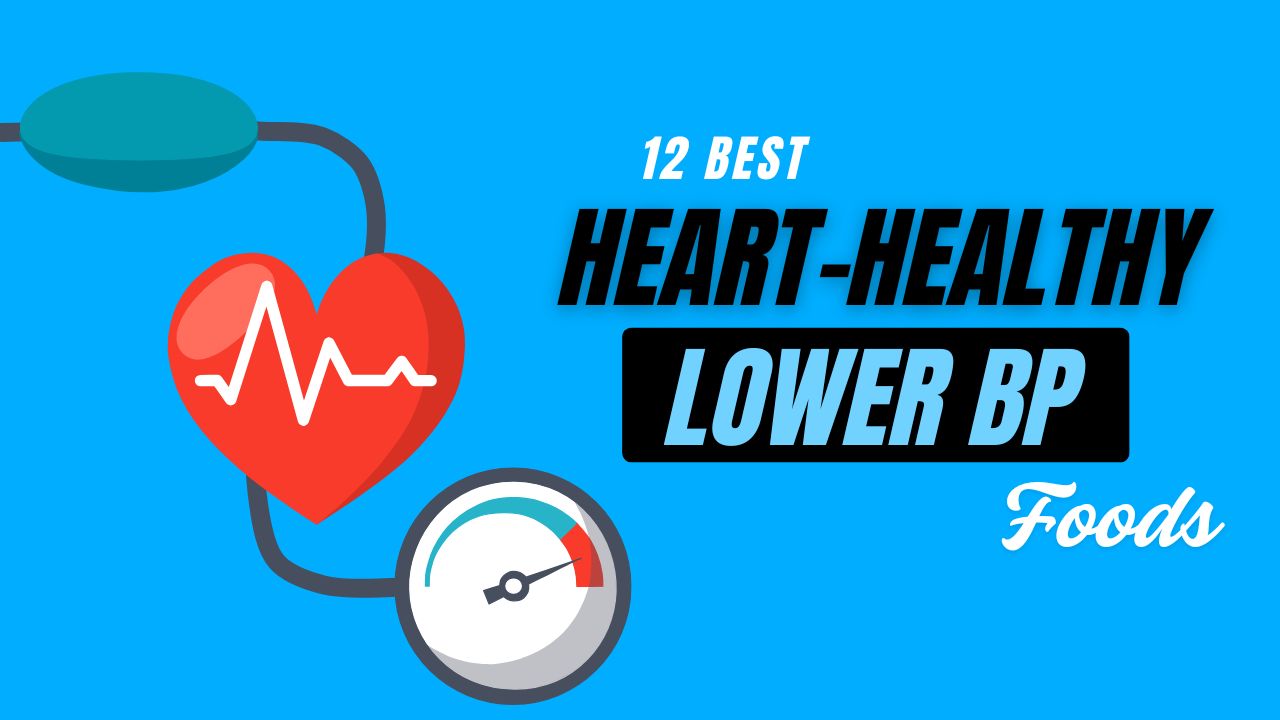Do you know that nearly one-third of adults worldwide suffer from anxiety or stress-related issues on a daily basis?
While modern medicine offers quick fixes, ancient wisdom points us to a quieter solution—herbal foods that naturally calm the nervous system.
For centuries, herbs and plant-based remedies have been used to restore balance, reduce tension, and promote restful sleep without harsh side effects.
This article explores the top 12 herbal foods that can nourish your body, relax your mind, and ease your nervous system. Whether you’re dealing with everyday stress, struggling to focus, or simply seeking natural ways to stay calm, these foods may help.
Here’s what you’ll find inside:
- The best calming herbs and foods backed by traditional use and modern research.
- Easy ways to eat, prepare, or use each food in your daily meals.
- Who should eat or avoid them based on health conditions.
- Buying, storing, and cooking tips to maximize freshness and nutrients.
- A quick Do’s & Don’ts table for practical guidance.
Let’s dive into nature’s medicine cabinet and discover how these 12 calming herbal foods can support your nervous system.

Table of Contents
Top 12 Herbal Foods To Calm Nervous System
1. Chamomile
Chamomile has been used for centuries as a gentle relaxant. It contains apigenin, an antioxidant that binds to receptors in the brain, promoting relaxation and reducing insomnia.
Best Ways to Eat or Use It
- Brew as a soothing tea before bedtime.
- Add dried chamomile flowers to smoothies.
- Infuse in honey or warm milk for a calming night drink.
Who Should Eat / Avoid
- Good for: people with mild anxiety, children with sleep troubles, adults experiencing restlessness.
- Avoid if: allergic to ragweed, daisies, or marigolds.
Storage & Buying Tips
- Choose whole dried flowers over powdered for maximum potency.
- Store in an airtight glass jar away from light and moisture.
Do’s & Don’ts
✅ Do: drink regularly for better results.
❌ Don’t: rely on chamomile if you are on blood-thinning medication.
Possible Side Effects
- May interact with blood thinners or sedatives.
- Mild allergic reactions in sensitive individuals.
2. Lemon Balm
A member of the mint family, lemon balm is often called the “calm herb.” Studies show it helps reduce cortisol (the stress hormone) and improves mood.
Best Ways to Eat or Use It
- Brew as tea (fresh or dried leaves).
- Add to salads or fruit-infused water.
- Blend into pesto with basil.
Who Should Eat / Avoid
- Good for: students, professionals under stress, people with digestive-related anxiety.
- Avoid if: you have thyroid disorders (it may interfere with thyroid hormones).
Storage & Buying Tips
- Buy fresh bunches with vibrant green leaves.
- Refrigerate in damp paper towels to extend freshness.
Do’s & Don’ts
✅ Do: combine with chamomile or valerian for stronger effects.
❌ Don’t: consume in very high amounts—can make you drowsy.
Possible Side Effects
- Excessive use may cause nausea.
- Can interact with thyroid medications.
3. Ashwagandha
Known as an adaptogen, ashwagandha helps the body adapt to stress by balancing cortisol levels. Ayurvedic medicine has used it for centuries to strengthen the nervous system.
Best Ways to Eat or Use It
- Mix powdered ashwagandha in warm milk or smoothies.
- Add to herbal teas.
- Capsules are also available.
Who Should Eat / Avoid
- Good for: people with chronic stress, fatigue, or low energy.
- Avoid if: pregnant, breastfeeding, or suffering from hyperthyroidism.
Storage & Buying Tips
- Choose organic powder without fillers.
- Store in a cool, dry place.
Do’s & Don’ts
✅ Do: take with warm milk for better absorption.
❌ Don’t: take with alcohol or sedatives.
Possible Side Effects
- May lower blood sugar and blood pressure.
- Large doses can cause digestive upset.
4. Lavender
Lavender is famous for its calming aroma, but did you know it’s also edible? Its natural oils reduce tension and promote better sleep.
Best Ways to Eat or Use It
- Brew lavender tea.
- Add small amounts to baked goods.
- Use lavender-infused honey.
Who Should Eat / Avoid
- Good for: people with restlessness, sleep issues, or mild depression.
- Avoid if: pregnant or breastfeeding (strong essential oils may affect hormones).
Storage & Buying Tips
- Store dried lavender in sealed containers away from sunlight.
- Choose culinary-grade lavender.
Do’s & Don’ts
✅ Do: use sparingly in food for a floral flavor.
❌ Don’t: overconsume—it can be overpowering.
Possible Side Effects
- Excess use may cause nausea.
- Can interfere with some medications.
5. Holy Basil (Tulsi)
In Ayurveda, Tulsi is called the “Queen of Herbs.” It lowers stress, balances the nervous system, and supports overall immunity.
Best Ways to Eat or Use It
- Drink tulsi tea daily.
- Add fresh leaves to soups and curries.
- Blend into smoothies.
Who Should Eat / Avoid
- Good for: people dealing with emotional stress, frequent colds, or fatigue.
- Avoid if: pregnant (may stimulate the uterus).
Storage & Buying Tips
- Buy fresh tulsi with strong aroma.
- Store leaves wrapped in a moist cloth inside the fridge.
Do’s & Don’ts
✅ Do: sip tulsi tea daily for calmness.
❌ Don’t: overconsume—it can thin the blood.
Possible Side Effects
- May interfere with anticoagulant medications.
- Can lower blood sugar.
6. Oats
Surprising to many, oats are not just a breakfast food—they’re a nervine tonic, meaning they nourish and restore the nervous system.
Best Ways to Eat or Use It
- Warm oatmeal with nuts and fruits.
- Oat milk in smoothies.
- Oat-based energy bars.
Who Should Eat / Avoid
- Good for: athletes, people with stress fatigue, and children.
- Avoid if: gluten-intolerant (choose certified gluten-free oats).
Storage & Buying Tips
- Store in airtight containers.
- Choose steel-cut or rolled oats over instant.
Do’s & Don’ts
✅ Do: combine with magnesium-rich fruits for better calming effect.
❌ Don’t: rely on instant sugary oat packets.
Possible Side Effects
- Rare allergies to oats.
- May cause bloating in sensitive individuals.
7. Valerian Root
Valerian is known as “nature’s Valium.” Its compounds help increase GABA in the brain, promoting calmness and reducing anxiety.
Best Ways to Eat or Use It
- Drink valerian tea.
- Take in capsule or tincture form.
Who Should Eat / Avoid
- Good for: insomnia sufferers, people with tension headaches.
- Avoid if: pregnant, breastfeeding, or operating heavy machinery.
Storage & Buying Tips
- Store in a cool, dark place.
- Buy organic, dried root.
Do’s & Don’ts
✅ Do: use before bedtime for restful sleep.
❌ Don’t: combine with alcohol or sedatives.
Possible Side Effects
- May cause drowsiness and vivid dreams.
- Not for long-term continuous use.
8. Passionflower
Passionflower has been used by Native Americans for calming the mind. Research shows it reduces anxiety as effectively as mild anti-anxiety drugs.
Best Ways to Eat or Use It
- Passionflower tea.
- Capsules or tinctures.
Who Should Eat / Avoid
- Good for: people with anxiety or restlessness.
- Avoid if: pregnant or taking sedatives.
Storage & Buying Tips
- Store dried leaves in airtight jars.
- Check expiry dates carefully.
Do’s & Don’ts
✅ Do: combine with chamomile for stronger results.
❌ Don’t: overdose—it can cause excessive sedation.
Possible Side Effects
- Drowsiness.
- Interactions with sedatives.
9. Peppermint
Peppermint not only soothes digestion but also helps relax nervous tension. Its menthol content has a cooling, calming effect.
Best Ways to Eat or Use It
- Peppermint tea.
- Add fresh leaves to water or salads.
- Use as essential oil in aromatherapy.
Who Should Eat / Avoid
- Good for: stress-related digestive discomfort.
- Avoid if: suffering from acid reflux.
Storage & Buying Tips
- Buy fresh bunches.
- Store stems in water like fresh flowers.
Do’s & Don’ts
✅ Do: sip after meals for digestion and calmness.
❌ Don’t: use peppermint oil directly on skin without dilution.
Possible Side Effects
- Can worsen acid reflux.
- Allergic reactions are rare.
10. Green Tea (L-Theanine Rich)
Green tea is rich in L-theanine, an amino acid that promotes relaxation without drowsiness.
Best Ways to Eat or Use It
- Drink freshly brewed green tea.
- Add matcha powder to smoothies.
Who Should Eat / Avoid
- Good for: students, office workers, people needing calm focus.
- Avoid if: sensitive to caffeine.
Storage & Buying Tips
- Store in airtight tin containers.
- Keep away from moisture and heat.
Do’s & Don’ts
✅ Do: sip during the day for relaxed focus.
❌ Don’t: drink late at night—it may disrupt sleep.
Possible Side Effects
- Excessive intake may cause insomnia.
- Can lower iron absorption.
11. Rosemary
Often seen as a cooking herb, rosemary also boosts circulation and calms the nervous system. Ancient Greeks used it to sharpen memory and reduce stress.
Best Ways to Eat or Use It
- Use in soups, roasted vegetables, or bread.
- Brew rosemary tea.
Who Should Eat / Avoid
- Good for: memory, focus, and mild stress.
- Avoid if: pregnant (in large amounts).
Storage & Buying Tips
- Choose fresh sprigs with deep green leaves.
- Store wrapped in paper towels inside the fridge.
Do’s & Don’ts
✅ Do: use fresh for maximum benefits.
❌ Don’t: consume in excessive amounts—it can be stimulating.
Possible Side Effects
- May increase blood pressure in high doses.
12. Sage
Sage is more than a culinary herb—it has calming and cognitive-enhancing effects.
Best Ways to Eat or Use It
- Add fresh sage to soups, teas, or roasts.
- Sage tea before bedtime helps relaxation.
Who Should Eat / Avoid
- Good for: people with anxiety-related fatigue or brain fog.
- Avoid if: pregnant (strong uterine stimulant).
Storage & Buying Tips
- Fresh sage should look gray-green and velvety.
- Store in fridge wrapped in damp towels.
Do’s & Don’ts
✅ Do: use small amounts daily.
❌ Don’t: overuse concentrated sage oils.
Possible Side Effects
- Too much can cause digestive issues.
Conclusion
Stress and anxiety may be modern epidemics, but nature offers powerful, gentle remedies. From calming teas like chamomile and lemon balm to adaptogens like ashwagandha and nutrient-rich oats, these herbal foods can help you restore balance, improve focus, and sleep better.
Why not try introducing one or two of these herbs into your diet this week? Something as simple as a warm cup of chamomile tea or a sprig of rosemary in your dinner could be the first step toward a calmer, healthier nervous system.
Which of these calming herbal foods have you tried before? Share your favorite recipes or herbal remedies in the comments below!
Frequently Asked Questions (FAQs)
Which herbal foods are best for calming the nervous system quickly?
Chamomile, lemon balm, and passionflower are known for their fast-acting calming effects. A warm cup of chamomile or lemon balm tea can help reduce anxiety and promote relaxation within 20–30 minutes.
Can I take chamomile tea every day?
Yes, chamomile tea is safe for most people to drink daily. However, those on blood-thinning medications or with ragweed allergies should consult a doctor before regular use.
What is the best time to consume calming herbs?
Evening or bedtime is ideal for herbs like chamomile, valerian, and lavender as they promote sleep. Herbs like green tea or rosemary are best consumed earlier in the day since they also support focus and alertness.
Are there side effects of consuming too many calming herbs?
Yes, overconsumption may lead to drowsiness, digestive upset, or interactions with medications. For example, high doses of valerian root may cause vivid dreams, and excess green tea may lead to insomnia due to caffeine.
Who should avoid taking calming herbal foods?
Pregnant or breastfeeding women, people on blood-thinning medications, and those with thyroid disorders should be cautious. Always check with a healthcare provider if you’re on long-term medication.
How long does it take for herbal foods to show results on stress or anxiety?
Some herbs like chamomile or lemon balm can show calming effects within an hour, while adaptogens like ashwagandha or holy basil may take a few weeks of consistent use to balance the nervous system.
Can herbal foods replace anxiety medication?
Herbal foods can support stress management and improve mild anxiety, but they should not replace prescribed medication without medical advice. They are best used as complementary support.
Is green tea calming even though it contains caffeine?
Yes, green tea contains an amino acid called L-theanine, which promotes relaxation and focus. However, it’s best consumed during the day, as too much caffeine can disturb sleep.
Can children safely consume calming herbal foods?
Mild herbs like chamomile, lemon balm, and oats are generally safe for children in small amounts. However, strong herbs like valerian root and ashwagandha should be avoided unless recommended by a healthcare provider.










